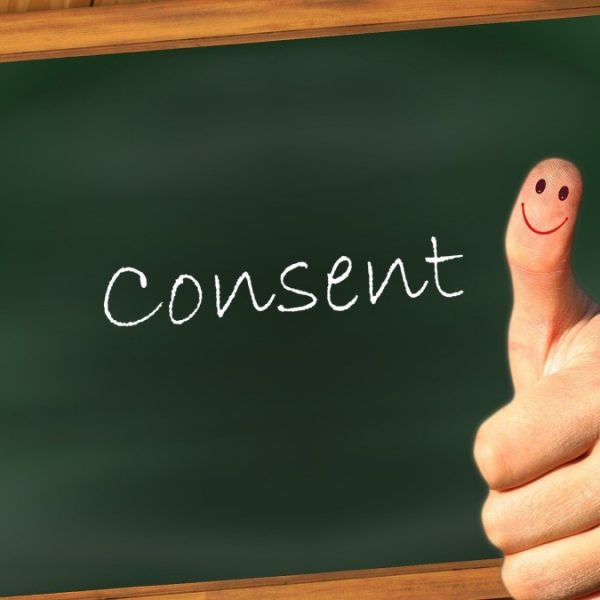The term “consent” is often associated with sex but is far broader than that. Consent relates to permission, boundaries and how to show respect for ourselves and for other people. Most importantly, it emphasizes that everyone should be comfortable with what they are engaging in and if you are uncomfortable at any point, you have the right to stop. Similarly, if someone you are interacting with appears uncomfortable, you need to check in with them and seek their approval of the activity, whatever that may be. Consent should therefore be addressed formally and informally from a young age. This should be done in age-appropriate ways and occur at home and within education settings.
In the early years, children should be taught how to affirm and respect personal boundaries. This can include non-sexual examples, such as choosing to share their toys, engaging in tickling, or giving hugs. Such a comment from an adult could be, “Jenny said she didn’t want a hug. When she says no, you have to stop.” In later years, conversations need to consider more intimate or sexual scenarios, as well as how these apply to the online space. Older students need to learn that sexual activity is something to be done with someone, not to someone. Consent is a critical part of this process, and it must be freely given, informed and mutual. It does not matter what gender or sexual orientation you are, if you are planning on engaging in any form of sexual activity, all individuals must give consent. In a recent Australian survey of secondary school students, more than a quarter (28.4%) of sexually active students reported an unwanted sexual experience. Their most common reasons for this were due to pressure from a partner, being intoxicated or feeling frightened.
This data reiterates the importance of consent education and furthermore that “Talking about consent and sex is everyone’s responsibility”. We should be careful not to oversimplify the issue of consent and acknowledge that while these conversations can be awkward or uncomfortable for everyone. That certainly does not mean that we should shy away from having them. Instead, as adults we need to take the lead and normalise these conversations.
How do I start the Conversation?
- These conversations do not and in fact, should not be once off, formal, sit down education sessions. Instead, bring the topic into your conversations, make it casual and comment on something that you have both seen, witnessed, or been exposed to.
- For example, after watching a couple interact on a tv show, or viewing a news article, you might make a comment about the issue and facts. As well as highlight that you think it is important to value and talk about consent and sexual relationships. This gets you past the initial discomfort and tests how ready your adolescent is to talk about these issues.
- You can also ask more direct questions such as, “What would you do if someone said they wanted to kiss you, but then they changed their mind?”, “Do you and your friends talk about consent?” or “How will you know if it’s okay to kiss or touch someone, or that they’re ready for sex?”
- Videos, TV shows and podcasts can be useful to watch/listen to together and these will open further avenues for conversation. For example:
What are the key things that we all need to know about consent?
- Consent is a normal and essential part of all healthy relationships. Seeking consent shows respect and leads to better communication and intimacy.
- We all have a right to feel safe, comfortable and pleasured.
- Consent must be given freely, and no one can be made to consent to something. It is not consent if someone does something because they feel like they must. More information about the signs of being pressured to give consent can be found here.
- Consent is not about doing whatever we want until we hear the word “no”. Ideally, all interactions involve an enthusiastic “yes”. If we want to do something sexual with another person, the responsibility lies with us to gain and check for consent, not with the other person to say “no” if they do not want to.
- It is also important to pay attention to body language and non-verbal cues. We should feel confident that the other person is enjoying the activity. If they are tense, they may be nervous or frightened and trying to hide how they really feel. If we are ever unsure, we must stop and ask them.
- Just because someone consented to something once, does not mean they have consented to that every time or that they will consent to it again in future. Instead, we need to ask again, as they could feel differently from last time.
- Similarly, consent to one sort of sexual activity does not mean consent to everything.
- People need to be able to freely give their consent. If someone is unconscious, drunk or asleep, they cannot freely give consent.
- We cannot assume. If we are ever uncertain – it is not consent.
- Likewise, if we are unsure about engaging in an activity, we can say ‘No’. We can say ‘Yes’ to one activity and ‘No’ to another and we can change our minds. We all need to have the language to do this. For example, ‘I don’t want to go any further’, ‘That does not feel good for me’, ‘How about this instead?’ or ‘Let’s slow down’.
More resources can be found below:
Nicole Young
College Psychologist



